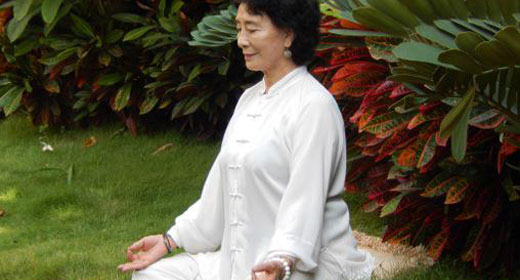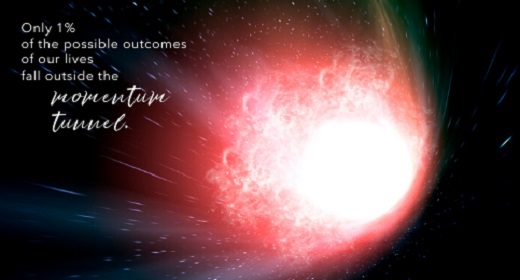David Welch: What are the three levels in Mindfulness?
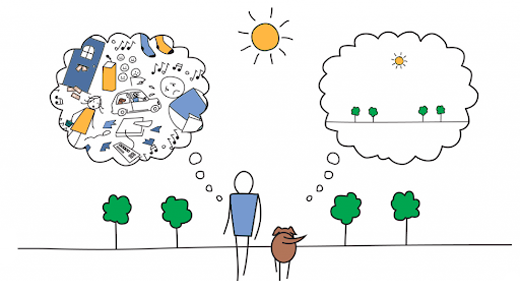
Gunner Michanek: Mental, emotional and physical. And when they get in harmony, you are whole. In the Christian way, you are holy. There is no goal in mindfulness but a lot of people experience that one-day. Understanding how the mental, thinking, emotional, feeling, and physical systems work. Many of them get to a ‘wow’, this is a deep relaxation, I’ve come to my intuitive center, to my soul. And that is something that is really transforming. That’s a great shift and a great journey for many people.
David: And the heart center, the emotional center… Is that where the intuition is? And is it a much deeper awareness than the intellect?
Gunner: Yea. In my groups, I realized a lot of people mix feelings with a deeper intuitive center. For feelings, you get angry or happy. You feel sorrow and all these feelings. They can be connected to an individual ego structure. And they are more expressions for the ego. But beneath that, when you come to the intuitive center… then I’m not pointing at the heart. The intuitive center is more like a ‘soul’ place between your second and third chakra. There is the place for the intuitive center. And that is including the love. And that’s including the whole body. And we used to say it’s the heart. My experience is that it’s in every cell in your body. It’s a little bit of a mixture in the usual language when we talk about heart and feelings because feelings can be really superficial. They are not necessarily connected to the depth of the soul. They can be connected to the thought system and the ego. When you realize the difference between the linguistic systems, you separate the systems and you come down to the soul and you come down to the unit system; Unity, Harmony, and Oneness. Then there can be a lot of emotions. They are coming from nowhere, from the earth, from everywhere. They are just vibrating everywhere. After meditating for a while you can see the difference. Perhaps an old wound that comes up as angering me. Or it comes as beautiful force of life energy! And it’s not connected to ego. It’s connected to the life spirit.
David: Your hands are coming up from the root chakra. To me, the root chakra is connected to the universe. It’s connected with infinity. It’s connected with the collective consciousness. It’s the plug in to everything. So that is a much deeper awareness, obviously. So mindfulness is techniques and methods to know ourselves at all these different levels. We were starting off with breathing and focusing on the body. Talk a little bit more about how we start going to these deeper levels.
Gunner: We have many different types of groups. Most of the people that come to us have never done anything. Just to be aware of your thoughts is a strange question if you haven’t been watching it before. ‘I think… What is the problem with that?’ People can more easily see their feelings. So we start very softly. Can you see your feelings?
David: Is there a difference between feelings and emotions? Cause I’ve always felt that anger is more of an emotion and feeling is something a little bit deeper. Emotions were kind of judgments’ about feelings. It seems like emotions have judgments’ in them.
Gunner: Thank you for telling me. I’ve been asking English people for the last 15 years what the difference between feeling and emotions are and hearing different things. In Swedish we only have one word. But what I use in the teaching may be wrong in the English connotation of it. But what we use is feeling is connected to thought and ego. Because emotion comes from Latin root Emovoir. And that means movement or move-out. For me, feelings are more like waves connected to the ego and the movements is more coming from the earth. So that’s why I use emotion as deeper sense felt, to observe your feeling pattern, the connection to the thought patterns. The connection to the body, soul experience. And to take them step by step into what is quite a great process because if you have never thought about it or never witnessed your feelings or your thoughts, It’s a big step. During this eight-week program they get into digital platforms, so they train every day with the meditation. And we meet once a week for two and a half hours.
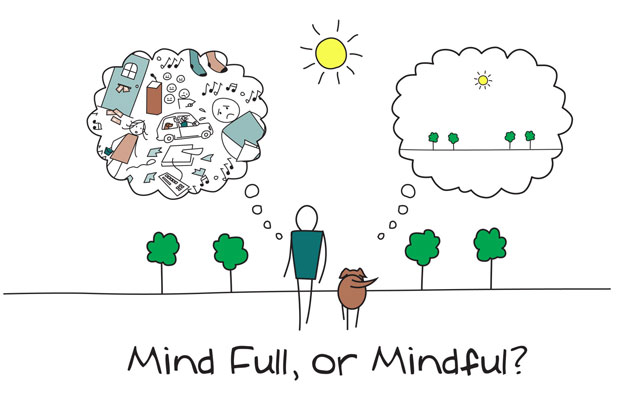
David: And then there is homework and I go home and meditate and do different things that you have assigned me and then I come back.
Gunner: Yea, Lot’s of short breathing meditations and then the Body Scan Yoga. So that’s the individual process and you try to get to where many people are like ‘Ah Ha, Oh I can see my thoughts’. ‘I can see I’m angry’, ‘what am I angry at?’ ‘I’m angry at you, fool’! And they say is that true? And you experiment and they can see… Oh, the anger is more in me. It’s a great process and people often start to cry and say ‘This is marvelous, I can see myself’. They can go into stillness and from that stillness they can see more and more of these processes.
David: Stillness, silence. That obviously is a much deeper level of self. That’s pretty hard to define. How do you define the self as silence? How does this mindfulness practice get you into silence?
Gunner: First, I would like to comment about what you said. Mindfulness is very humble in that we never indicate that people should reach anywhere or that silence is your true self. Mindfulness is very humble in that way that it will give you a big variety of exercises and we say ‘witness what is happening within you when you do this’. So people find out themselves. So people can go on for one year and not find silence and others six weeks and ‘whoa, I found silence.’ So it’s very important you don’t try and impose on people where they could perhaps arrive. Give them the tools to try. And you see in the group that perhaps this could be a tool for them. Give them the tools to know the various systems. The mind, emotional and body systems. And out of that knowledge, people can and often do arrive to something beyond. And we don’t call it the Self because then it’s too much for them. Even closing your eyes can be difficult for some people. So you have to be very careful taking them into this. So to establish a relaxed atmosphere, care taking, allowing… and things usually happen by themselves.
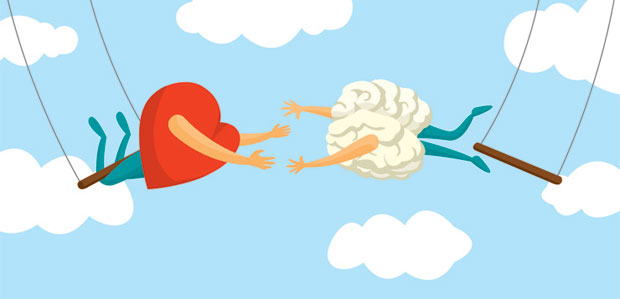
In 1979 I can also say that Jon Kabat-Zinn worked with more than 20,000 people. He realized there were certain words that people came back to. So he established seven attitudes that we go through a lot. And the first attitude is even included in the definition of mindfulness because the definition is ‘to be present in the moment, non-judging. And the reason he added this that he realized that when you stopped this process, people are judging themselves all the time. ‘I should be better, faster, why did I think, I should be quite.’ People are judging. And when I started I had been working in this field for more than 15 years and I thought ‘I’m not judging myself’. And then one day I realized, I passed by a window and immediately my hand was coming up and correcting my hair. And I was like ‘what?’ ‘Did I just judge myself?’ So I realized it’s a deep forces in most of us, that we judge ourselves.
And He also came up with a scientific study that most people judge themselves more than 200 times a day. ‘I should be faster’, ‘why didn’t I do that?’, ‘I should look different’. And I started to realize, I’d ask my wife ‘is this nice?’, ‘Do you like my shirt?’, ‘was the food good enough?’ It’s a judging. That’s the main principle. To look at your judging. So that’s the first attitude.
David: And not judging yourself for being a judge!
Gunner: Yea! And then comes acceptance to accept what is.
David: What is. Right now, I might be judgmental and I have to accept that.
Gunner: Yea. When we go to companies… acceptance is the most difficult attitude because people… They don’t want to accept that there is war in Syria. That can be a difficult understanding at first but when you go into it you get it. Accept reality as it is. It doesn’t mean you shouldn’t try to change it but if you start by not accepting it… you start at the wrong point. So really accept. So now I’m sad, ‘I don’t want to be sad’. Well, I am sad. If I start there, I can change it. Jon Kabat-Zinn was working a lot with stress and pain patients. And he came out with (for that time) a very strange thing. People said, ‘I don’t want my pain’. When he had 3 or 4 thousand people come to the stress reduction clinic, everyone said, ‘I don’t want my pain’. He realized, they don’t accept they have pain. So he turned it around. ‘Love your pain’. We tell people that in our groups and they are like ‘come on, are you serious?’ But that is the turning point. You accept it. It doesn’t mean you shouldn’t work with it. But if you accept, ‘I have pain’.
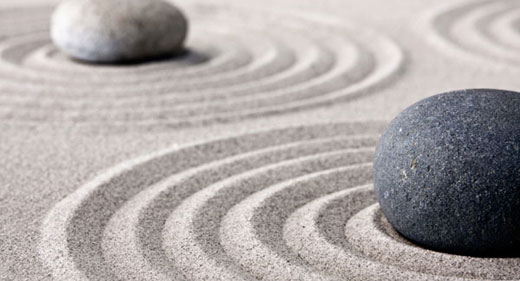
David: Then you can then work with it because you accept that it’s my pain. And now you can work with it.
Gunner: And that is a great step. For many people it’s difficult for people to get it. But it’s really good. Then there is trust. Trust that everything is as it should be.
David: Even this pain, even this judging mind.
Gunner: Everything! Trust that there is something bigger than we are that has created this and it’s done to support us in some way. Sometimes it’s difficult to see. These attitudes are good because people get ‘Ah-ha’s’ in different ways. We go through these different attitudes for a half hour each lecture we go through one of them. We meditate on them and then we say ‘how are you’? Do you use this attitude in your normal life. And one that is very good in Western Society is patience. Because people are really all the time like ‘what is next’? They are really impatient. Just to sit down and do nothing. People have been doing that for hundreds of years. And now, the first thing that happens, people are up. It’s also a way of cultivating your self-knowledge.
And then you have striving. Many of us strive from the ego. The structure that comes from parents, our culture, our society. And we are not aware of striving. So we think, ‘I want to be the best mountain climber in the world’. Why do you want to be that? ‘I just want to be that’. And if you are aware of why, you can make another suggestion. There is no problem with striving but if you are not aware it can be a problem. I’m striving because my heart says I should go in this direction. My deeper intuition says so. Then it’s good. As long as you are not sure where your striving is coming from it can be a trap. And many people start to think ‘maybe I’m striving because my father wanted me to do it’.
Read Part I Here: Mindfulness Is A Way Of Living
Read Part III Here: Come Down To The Deepest Level Of Your Intuition
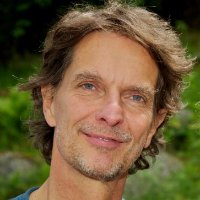 Gunnar Michanek: is a life-long mediator and has extensive experience as a teacher for leadership development through Mindfulness & Emotional Intelligence. In this capacity he has trained awareness techniques in hundreds of companies, at the Swedish Parliament and has run training programs for Mindfulness instructors. Gunner is also a film and T producer and is the founder of Mindfulnessgruppen and Minds Unlimited. Gunner lives in Stockholm, Sweden
Gunnar Michanek: is a life-long mediator and has extensive experience as a teacher for leadership development through Mindfulness & Emotional Intelligence. In this capacity he has trained awareness techniques in hundreds of companies, at the Swedish Parliament and has run training programs for Mindfulness instructors. Gunner is also a film and T producer and is the founder of Mindfulnessgruppen and Minds Unlimited. Gunner lives in Stockholm, Sweden
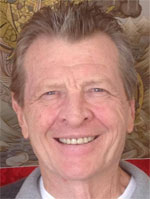 David Welch: is the founder and CEO of Awaken Global Media and Chief Editor of AWAKEN.com. He is the Producer of the award-winning movie “Peaceful Warrior” and a member of the Directors Guild of America and the Screen Actors Guild. David is a master practitioner of Neuro-linguistic programming, a certified Kundalini Yoga instructor and has a continuous, committed and daily yoga, meditation and Qigong practice.
David Welch: is the founder and CEO of Awaken Global Media and Chief Editor of AWAKEN.com. He is the Producer of the award-winning movie “Peaceful Warrior” and a member of the Directors Guild of America and the Screen Actors Guild. David is a master practitioner of Neuro-linguistic programming, a certified Kundalini Yoga instructor and has a continuous, committed and daily yoga, meditation and Qigong practice.

